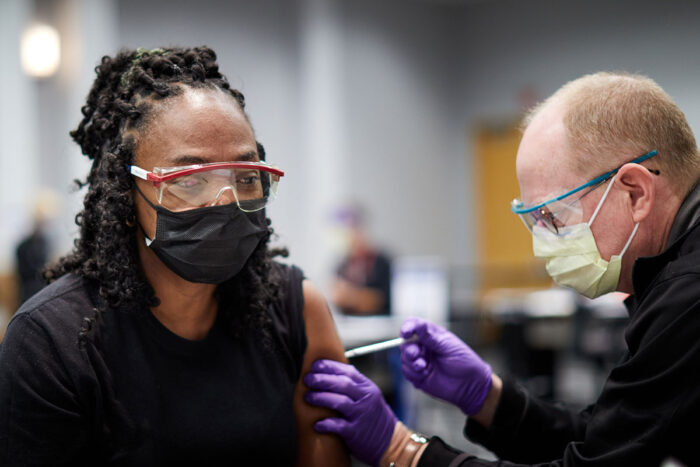Antibodies elicited by COVID-19 vaccination effective against delta variant
Findings help explain why vaccinated people at low risk during delta surge
 Matt Miller
Matt MillerCherry Grimmett, a BJC HealthCare security officer, receives her first dose of the Pfizer COVID-19 vaccine in December 2020. Researchers at Washington University School of Medicine in St. Louis have found that the delta variant of the virus that causes COVID-19 is largely unable to evade antibodies elicited by vaccination. The findings help explain why vaccinated people have been at low risk of getting seriously ill with COVID-19 despite a surge in cases caused by the delta variant.
Despite causing a surge in infections this summer that has resulted in thousands of hospitalizations and deaths, the delta variant of the virus that causes COVID-19 is not particularly good at evading the antibodies generated by vaccination, according to a study by researchers at Washington University School of Medicine in St. Louis.
The researchers analyzed a panel of antibodies generated by people in response to the Pfizer COVID-19 vaccine and found that delta was unable to evade all but one of the antibodies they tested. Other variants of concern, such as beta, avoided recognition and neutralization by several of the antibodies.
The findings, published Aug. 16 in the journal Immunity, help explain why vaccinated people have largely escaped the worst of the delta surge.
In previous studies, co-senior author Ali Ellebedy, PhD, an associate professor of pathology & immunology, of medicine and of molecular microbiology, had shown that both natural infection and vaccination elicit lasting antibody production. But the length of the antibody response is only one aspect of protection. The breadth matters, too. An ideal antibody response includes a diverse set of antibodies with the flexibility to recognize many slightly different variants of the virus. Breadth confers resilience. Even if a few antibodies lose the ability to recognize a new variant, other antibodies in the arsenal should remain capable of neutralizing it.
“The fact that delta has outcompeted other variants does not mean that it’s more resistant to our antibodies compared to other variants,” said co-senior author Jacco Boon, PhD, an associate professor of medicine, of molecular microbiology and of pathology & immunology. “The ability of a variant to spread is the sum of many factors. Resistance to antibodies is just one factor. Another one is how well the variant replicates. A variant that replicates better is likely to spread faster, independent of its ability to evade our immune response. So delta is surging, yes, but there’s no evidence that it is better at overcoming vaccine-induced immunity compared to other variants.”
To assess the breadth of the antibody response to SARS-CoV-2, the virus that causes COVID-19, Ellebedy and colleagues — including co-first authors Aaron Schmitz, PhD, a research specialist; Jackson S. Turner, PhD, an instructor in pathology & immunology; and Zhuoming Liu, PhD, a staff scientist — extracted antibody-producing cells from three people who had received the Pfizer vaccine. They grew the cells in the laboratory and obtained from them a set of 13 antibodies that target the original strain that began circulating last year.
The researchers tested the antibodies against four variants of concern: alpha, beta, gamma and delta. Twelve of the 13 recognized alpha and delta, eight recognized all four variants, and one failed to recognize any of the four variants.
Scientists gauge an antibody’s usefulness by its ability to block virus from infecting and killing cells in a dish. So-called neutralizing antibodies that prevent infection are thought to be more powerful than antibodies that recognize the virus but can’t block infection, although both neutralizing and non-neutralizing antibodies contribute to defending the body.
The researchers found that five of the 13 antibodies neutralized the original strain. When they tested the neutralizing antibodies against the new variants, all five antibodies neutralized delta, three neutralized alpha and delta, and only one neutralized all four variants.
“In face of vaccination, delta is relatively a wimpy virus,” Ellebedy said. “If we had a variant that was more resistant like beta but spread as easily as delta, we’d be in more trouble.”
The antibody that neutralized all four variants of concern — as well as three additional variants tested separately — was called 2C08. In animal experiments, 2C08 also protected hamsters from disease caused by every variant tested: the original variant, delta and a mimic of beta.
Some people may have antibodies just as powerful as 2C08 protecting them against SARS-CoV-2 and its many variants, Ellebedy said. Using publicly available databases, the researchers discovered that about 20% of people infected or vaccinated against SARS-CoV-2 create antibodies that recognize the same spot on the virus that is targeted by 2C08. Moreover, very few virus variants (.008%) carry mutations that allow them to escape antibodies targeting that spot.
“This antibody is not unique to the person we got it from,” Ellebedy said. “Multiple antibodies targeting this area have been described in the literature; at least one is under development as a COVID-19 therapy. Similar antibodies have been generated by people infected in Italy and people infected in China and people vaccinated in New York. So it’s not limited to people of certain backgrounds or ethnicities; it’s not generated only by vaccination or by infection. A lot of people make this antibody, which is great because it is very potent and neutralizes every variant we tested.”






